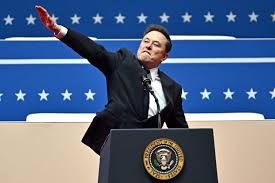Note: If you wish to receive, via e-mail, (1) my weekly newsletter or (2) daily copies of these posts, write to me at rrbates1951@gmail.com. Comments may also be sent to this address. I promise not to share your e-mail with anyone. To unsubscribe, write here as well.
Monday
In February 2022 I shared “We Lived Happily During the War,” by Ukrainian-American poet Ilya Kaminsky, because it was important that Americans oppose Russia’s invasion of Ukraine. Little did I think that America would be experiencing its own invasion two years later. As Ruth Ben-Ghiat, an expert on fascist takeovers, points out,
We are living through a new kind of coup in which Elon Musk, the richest man in the world, has taken over the payment and other administration systems that allow the American government to function, and has locked out federal employees from computer systems. Many of Musk’s collaborators in this endeavor previously worked for his private companies and/or helped him take over Twitter.
For Ben-Ghiat, there is a frightening sense of familiarity to this:
What is happening now builds on classic authoritarian dynamics as I described them in Strongmen and in many essays for Lucid. There is always an “inner sanctum” that really runs the show, with its mix of family members and cronies, some with histories of working with or for foreign powers. And there is almost always a purge of the federal bureaucracy. That is now being carried out on a mass scale.
Ben-Ghiat notes that the goal is to “rearrange government around an extremist ideological project of Christian nationalism and White supremacy.” A second goal is to “enact neoliberal deregulation and privatization meaures.” Progress on both fronts has been horrifyingly rapid:
The speed of its implementation makes Trump’s takeover stand out within an authoritarian framework. The more corrupt and criminal the autocrat, the more he is obsessed with punishing enemies and feeling safe. Cue the immediate execution of the revenge and retribution part of this plan, with anyone who was involved in attempts to bring Trump and his collaborators to justice for the Jan. 6 insurrection or anything else, FBI employees included, is now a target.
Only with coups, Ben-Ghiat concludes, does one see “such a rush to punish and expel non-loyalists from the government.”
With that in mind, Kaminsky’s poem is a call for us to wake up, even if we ourselves are not yet suffering:
We Lived Happily During the War
By Ilya Kaminsky
And when they bombed other people’s houses, we
protested
but not enough, we opposed them but not
enough. I was
in my bed, around my bed America
was falling: invisible house by invisible house
by invisible house.
I took a chair outside and watched the sun.
In the sixth month
of a disastrous reign in the house of money
in the street of money in the city of money
in the country of money,
our great country of money, we (forgive us)
lived happily during the war.
What does enough protesting and enough opposing look like? Kaminsky doesn’t say and I myself don’t have clear answers. But just because we aren’t seeing obvious signs of people pushing back doesn’t mean that they aren’t. In her Washington Post column an aging Anne Lamott, who believes that resistance can’t be rushed, points out some of the quiet forms protest is taking:
It is in the witness and courage of the Right Rev. Mariann Budde. It is in the bags of groceries we keep taking to food pantries. It looks like generosity, like compassion. It looks like the profound caring for victims of the fires, and providing refuge for immigrants and resisting the idea that they are dangerous or unwanted, and reaching out to queer nieces, siblings and strangers and helping resist the notion that their identities are unworthy, let alone illegal.
And:
It is in our volunteer support for public schools and libraries, because we know the new president holds them in contempt and fear. Teachers and librarians are allies for souls who have been dismissed as hopeless.
Throughout history, it has always been the case that we can’t do more than what is doable. None of us can stop the coup on our own. But what we can do, we should do.


